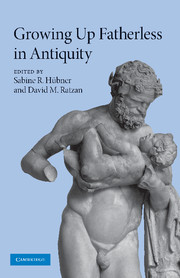Book contents
- Frontmatter
- Contents
- List of figures
- List of tables
- List of contributors
- Acknowledgments
- Note on abbreviations
- INTRODUCTION
- 1 Fatherless antiquity? Perspectives on “fatherlessness” in the ancient Mediterranean
- PART I COPING WITH DEMOGRAPHIC REALITIES
- PART II VIRTUAL FATHERLESSNESS
- PART III ROLES WITHOUT MODELS
- PART IV RHETORIC OF LOSS
- 11 The disadvantages and advantages of being fatherless: the case of Sulla
- 12 An imperial family man: Augustus as surrogate father to Marcus Antonius' children
- 13 Cui parens non erat maximus quisque et vetustissimus pro parente: paternal surrogates in imperial Roman literature
- 14 The education of orphans: a reassessment of the evidence of Libanius
- 15 “Woe to those making widows their prey and robbing the fatherless”: Christian ideals and the obligations of stepfathers in late antiquity
- Bibliography
- Index
15 - “Woe to those making widows their prey and robbing the fatherless”: Christian ideals and the obligations of stepfathers in late antiquity
Published online by Cambridge University Press: 30 July 2009
- Frontmatter
- Contents
- List of figures
- List of tables
- List of contributors
- Acknowledgments
- Note on abbreviations
- INTRODUCTION
- 1 Fatherless antiquity? Perspectives on “fatherlessness” in the ancient Mediterranean
- PART I COPING WITH DEMOGRAPHIC REALITIES
- PART II VIRTUAL FATHERLESSNESS
- PART III ROLES WITHOUT MODELS
- PART IV RHETORIC OF LOSS
- 11 The disadvantages and advantages of being fatherless: the case of Sulla
- 12 An imperial family man: Augustus as surrogate father to Marcus Antonius' children
- 13 Cui parens non erat maximus quisque et vetustissimus pro parente: paternal surrogates in imperial Roman literature
- 14 The education of orphans: a reassessment of the evidence of Libanius
- 15 “Woe to those making widows their prey and robbing the fatherless”: Christian ideals and the obligations of stepfathers in late antiquity
- Bibliography
- Index
Summary
When Augustine of Hippo wrote of his own father some twenty years after his death, he recalled him with something less than unqualified filial piety. Although always a “momma's boy,” the rhetor-turned-cleric's descriptions of his father were less than complimentary: he described Patricius as foul-tempered, uxorious, and spiritually weak. Indeed, his father's death merits hardly a comment in his autobiography; although his eventual conversion to Christianity did somewhat redeem him in his son's eyes. Augustine's was perhaps a unique opinion, insofar as he actually expressed such ambiguity, but the fact that for a good part of his minority, he grew up without a father was by no means unusual. As studies by Richard Saller, Brent Shaw, and several here in this volume have indicated, the phenomenon of fatherless households in ancient Rome was tied strongly to general marriage practices, resulting age differentiation in spouses, and of course mortality rates.
These trends did not significantly change in late antiquity. We have numerous examples of children growing up in households where the father was either deceased or simply absent for such extended periods of time that their children might as well have been fatherless. Nor did this appear to be a class or ethnically based situation. Theodosius II's minority was dominated and heavily regulated by his formidable elder sister, Pulcheria. The Ostrogothic king Theodoric's grandson and successor, Athalaric, grew up largely under the tutelage of his mother, Amalasuintha.
- Type
- Chapter
- Information
- Growing Up Fatherless in Antiquity , pp. 273 - 292Publisher: Cambridge University PressPrint publication year: 2009

